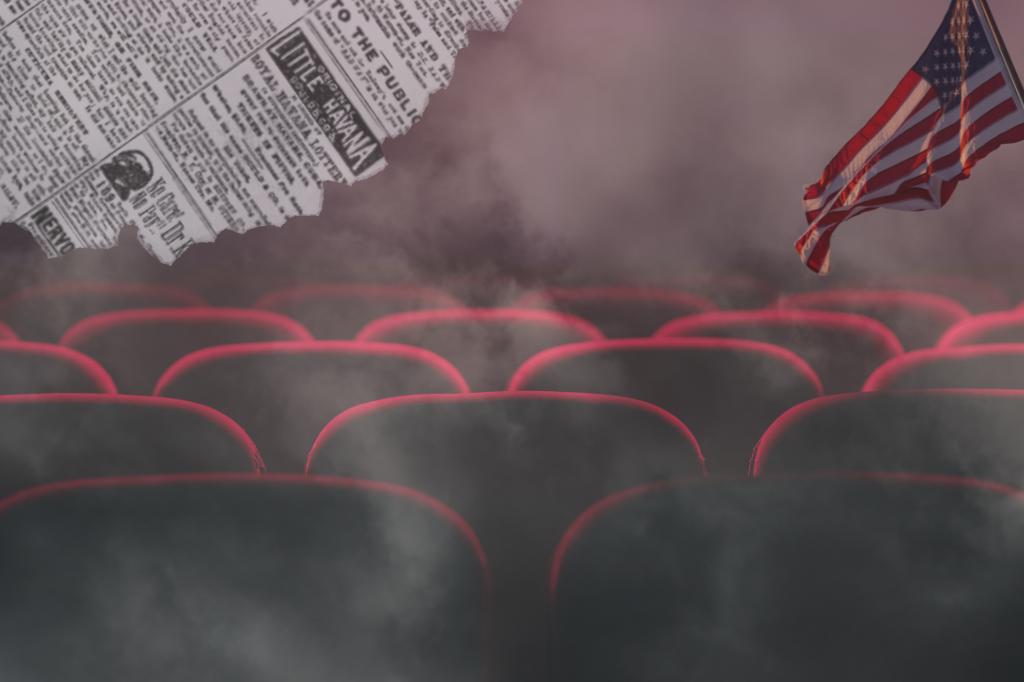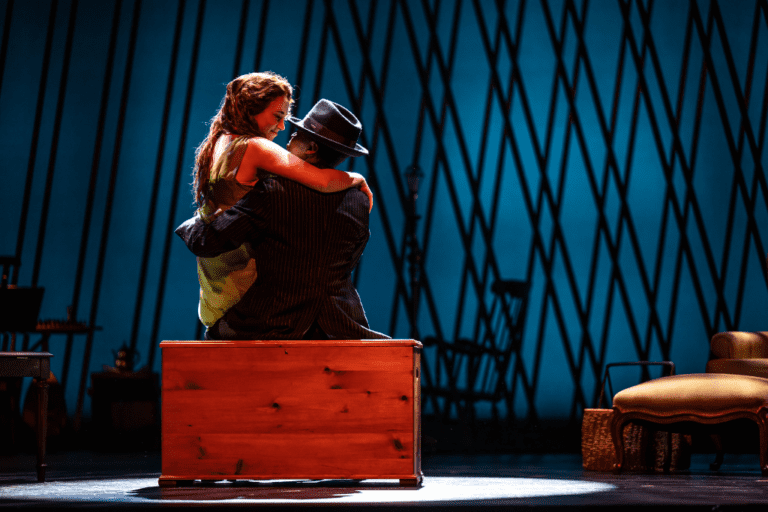Hey, Toronto audiences! Why are we laughing at white supremacy?
I hadn’t heard the surname “Trump” uttered publicly in a while — that is until last month, in the Crow’s Studio Theatre, where it was followed by a loaded burst of laughter.
The play was Will Arbery’s Heroes of the Fourth Turning, directed by Philip Akin and co-produced by Crow’s Theatre and The Howland Company; the conceit, a young band of conservative intellectuals reuniting at their Catholic college in rural Wyoming for a night of active discourse. Its general tone is dramatic and doomish, with the stage set as a casual backyard forum for religious and political debate. Still, surrounded by a majority white audience of presumed progressives, I found myself laughing along at the Trumpian rhetoric — until I stopped to ask myself why.
This production of Heroes was far from the first time I’d been part of an audience of white liberals chuckling through uncomfortable political talk. After all, I too have been complicit. I also laughed at my perceived short-sightedness of the white female protagonist in Redbone Coonhound last season at Tarragon, and at the display of oblivious white denial in Coal Mine Theatre’s Appropriate. I’ve signalled my place as one of “the good” white people, indicating my awareness of racist macro- and micro- aggressions through emphatic nods and vocalizations (not to mention social media infographic shares), often leveraging my queerness and leftist politics as evidence of my respectability.
But through being in audiences of other white folks performing similar tactics — the infographic activism, and the gestural showboating — this phenomenon of white liberal laughter, specifically in response to critiques of whiteness on our stages, has become a subject of increased interest and fascination to me.
It seems that this specific genre of plays — those showcasing, critiquing, and/or satirizing white power — has risen in popularity in the post-lockdown theatre economy, perhaps mirrored by the commercial successes of HBO’s Succession (which, ironically enough, recruited Arbery as a writer following the commercial success of Heroes) and The White Lotus. Promising to provide audiences with windows into upper-class privilege and corruption, these works often humourize (and dare I say indulge?) white ignorance and entitlement, sometimes framed as compelling and empathetic character studies of the one per cent. I must add that my massive generalisation here isn’t to erode the specificities of these works and their approaches to the subject; to equate, for instance, Moscovitch’s Post-Democracy and Santalucia’s Prodigal to Sibblies Drury’s Fairview would be careless at least, and problematic at most. While several of these plays (Appropriate and Fairview, notably, two works by Black American playwrights) endeavour to hold a mirror up to white supremacy for a largely white, middle-to-upper class audience, others (Heroes of the Fourth Turning, Post-Democracy, and Prodigal, all by white writers) seem to work against sweeping generalizations on either end of the political spectrum. This difference in approach, considering the identities of the playwrights, is non-accidental.
In each of these works, humour is deployed and evoked through various tactics — whether by the texts themselves, the directors, and/or the actors. Some of these playwrights (Moscovitch, Jacobs-Jenkins, Newton and Lavoie) craft intentional jokes to invoke involuntary complicity, or to allow their audiences to come to some form of shared revelation or understanding. Other directors (Santalucia, directing a Dora-winning Dan Mousseau in Prodigal; Ted Dykstra’s actor direction in Appropriate) prompt and encourage laughter from their audiences by and through their interpretations of the text. In Coal Mine’s Appropriate, for example, a borderline melodramatic fight between warring white family members elicited a thunderous burst of audience laughter when interrupted by one of their young sons — ignorantly, and innocently — walking downstairs wearing a Ku Klux Klan hood. To that particular joke, there is an intentional setup and payoff that posits the absurdity of white denial as the subject of its humour.
Now, there is undoubtable credence to the benefits of shared laughter as a form of disruption to hegemonic systems, and there may also be advantages of feeling humanely connected through laughter and seeing eye-to-eye with characters that we recognize as proximal to ourselves. But when these characters are violent white supremacists, I’m left wondering if laughter is enough of a conversation starter, or of a disruption in and of itself. When the laughter is over, where and how does this conversation progress?
I have no interest in waxing poetic about the function of theatre, which has always served to reflect a liberal humanist subject in the Vitruvian Man’s image: male, cisgender, able-bodied, and heterosexual. In the contemporary theatre, some would posit “to entertain” or “to educate” as simultaneous, even conflicting, approaches to theatre as a kind of public pedagogy. The question of “what do these plays do, politically?” is itself reductive — as a playwright myself, I think of the writing process as led by dramatic structure, emphasizing action, character, and plot, to which sociopolitical questions aren’t always tethered.
But — and I’m catching myself here as I type these words — perhaps that in itself is a product of my own whiteness. I’m not saying that theatre’s fixed function is to educate or to entertain, but I am saying that it inherently does both of those things, even if unintended. As theatre artists, we have responsibility over the way we are representing, mediating, and telling our stories.
And in today’s climate, there exists an undeniable general fascination with dramatizing the intimate workings of white supremacist logic — and humanizing it for public consumption. But what effect does this trend have in a wider conversational economy around theatre and whiteness? What are we — and by “we,” I’m speaking specifically to the white folks reading this article and engaging with these plays — gaining by seeing conservative characters act out conservative desires, values, and actions onstage? And more importantly: How are we, as white theatregoing patrons, ethically consuming critiques of white violence on our stages?
After all, Toronto’s theatre scene is far from a utopian, post-racial oasis. With Mirvish’s corporate-capital monopoly on theatre tourism, large-scale musical theatre productions (many imported, and the vast majority by white creators) draw the biggest audiences and profits in the region. The implementation of “Black Out Nights” — the phenomenon of reserving select performances exclusively for Black audiences, created by American Slave Play playwright Jeremy O. Harris — has sparked widespread outrage and news coverage in and beyond the city. Just this year, the National Arts Centre drew viral criticism over plans to host their first-ever “Black Out Night” for a scheduled performance of Is God Is (co-presented by Obsidian Theatre, Necessary Angel, and Canadian Stage) as a part of their Black History Month programming. Similar “Black Out Nights” have been adopted by Theatre Passe Muraille, Cahoots Theatre, Canadian Stage, Obsidian Theatre, the Musical Stage Company, and Tarragon Theatre, generating commercial success as well as online controversy. And lest we forget the public backlash to Yolanda Bonnell and Manidoons Collective’s request for racialized reviewers only to review Bonnell’s 2020 production of bug. These occurrences alone have exposed infrastructures of white rage and fragility bubbling in the underbelly of the Toronto theatre scene.
By laughing at the mention of Trump, whose ethnic nationalist and white supremacist ideologies still reverberate through global policies and politics, what precisely are we signalling?
That we, as a largely white liberal-leaning audience, are “with” the critiques of whiteness being presented through the play’s action?
That we recognize the flaws and wrongdoings of the characters, and that we align ourselves with the critiquing class?
Or, to take a less generous reading for a moment — to be visible in our progressive politics at a time of increased white anxiety and discomfort?
In “Decolonization is Not a Metaphor,” Unangax̂ scholar Eve Tuck coins the term “settler moves to innocence.” This is described as “an attempt to deflect a settler identity, while continuing to enjoy settler privilege and occupying stolen land.” I wonder to what extent laughter can be deflective — and how our collective reactions to these plays can commodify, and feed back into an economy of, white guilt that can ultimately bypass our accountability as white settler audiences. After all, as white spectators, we still benefit from enjoying plays made for, and often by, other white folks. Whether we’re consuming plays by white writers about other white characters, or by racialized playwrights talking to white audiences about their subject position, we are the intended audience for these stories. And where does that leave everyone else?
So here’s my final question: What would it take to move beyond these types of audience responses — or, more widely, these types of narratives? So long as the theatre remains inaccessible, financially and otherwise, so long as systemic racism and other inequities pervade the field, a move “beyond” the sociopolitical necessity for these narratives would warrant a full structural overhaul of the industry. In the interim, my hope is that this article acts as a conversation starter between white theatregoing patrons in and beyond the city of Toronto, giving new impetus to critical conversations about the material we’re all collectively consuming.
So the next time you take a seat in one of our revered theatres, wholly ready and willing to laugh at whatever critique of white power is thrust your way, take a moment to ask yourself who your laughter might benefit — and whose comfort it reinforces.









Comments